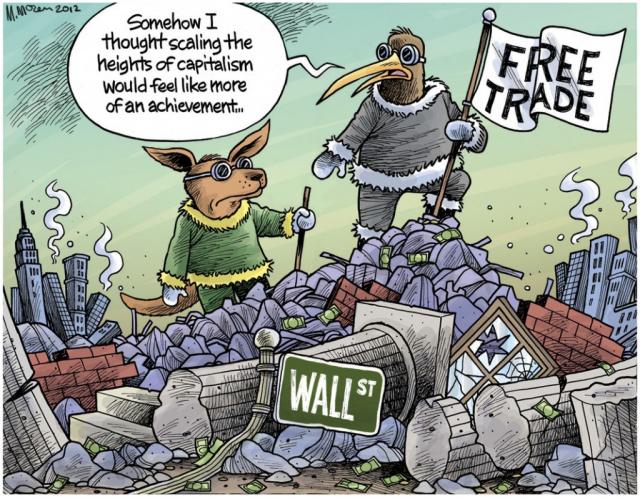Search
Recent comments
- grab....
1 hour 3 min ago - enlightenment....
2 hours 14 min ago - victory....
2 hours 19 min ago - unrest....
3 hours 18 min ago - disinformation...
11 hours 2 min ago - poisoned dart?....
14 hours 22 min ago - narrative control....
18 hours 29 min ago - chabad....
23 hours 45 min ago - back to the kitchen....
23 hours 47 min ago - loneliness....
1 day 1 hour ago
Democracy Links
Member's Off-site Blogs
no amount of trade is worth our sovereignty ….

Trade Ministers from the 12 TPP countries will meet in Singapore on December 7-9 to make decisions about the Trans Pacific Partnership Agreement (TPP).
But the US is still pushing for stronger patent laws which would result in higher medicine prices, & for investor-state dispute settlement clauses, which allow foreign corporations to sue governments over health & environment laws which are seen to 'harm' their interest. The Coalition government is still indicating that they are willing to negotiate on this issue in all trade agreements, including the Trans-Pacific Partnership agreement.
This would affect our ability to regulate in the public interest, & undermine our democracy & sovereignty, & unreasonably restrict copyright.
We need to act now to ensure that these proposals are rejected.
If you agree, please add your address & email the letter below to Minister Robb.
Cheers,
John.
-------------------------------------
The Hon. Andrew Robb
Minister for Trade and Investment
Parliament House
Canberra
By Email: [email protected]
Dear Mr Robb,
The Trans-Pacific Partnership (TPP), involving 12 nations across the Pacific, is now due for decision at meetings on December 7-9.
The TPP is not only about trade. The United States, on behalf of its major industries, wants to change Australian law in many areas of domestic policy. These policies should be decided through public and parliamentary processes, not through trade negotiations conducted behind closed doors.
We know from leaked documents that, despite opposition from most other governments, the US insisting on stronger patent rights which would mean higher prices for medicines. This is unacceptable. The Australian Government should join other governments which are resisting these demands.
We understand that your government is prepared to negotiate investor-state dispute settlement proposals (ISDS) which would enable foreign investors to sue governments for millions of dollars of damages in international tribunals if government regulation is seen to “harm” their investment.
ISDS reduces the ability of governments to regulate the activities of foreign companies even if these activities harm our health or the environment. The Philip Morris tobacco company is currently using ISDS in an obscure Australia-Hong Kong investment agreement to sue the Australian government over its tobacco plain packaging legislation. A US-based energy company is using ISDS to sue the Canadian Quebec provincial government because it is conducting an environmental review of shale gas mining.
The Howard Coalition Government rejected this proposal in the Australia-United States Free Trade Agreement, and I ask you to do the same in the TPP and all trade agreements.
Given the importance of these issues for Australian democracy and sovereignty, I ask you to release the text of any agreement for full public and Parliamentary discussion before it is signed by Cabinet.
Yours sincerely
- By John Richardson at 28 Nov 2013 - 2:35pm
- John Richardson's blog
- Login or register to post comments
the joke .....
from Noam Chomsky …..
The political theorist and linguist slams the agreement that has little to do with free trade.
Critics of the Trans-Pacific Partnership agreement - a purported free trade deal between 11 countries, including the U.S., Canada and Japan, which has been in negotiations for some years - have noted that the deal has little to do with free trade. Rather, the TPP is about limiting regulation, helping corporate interests and imposes fiercer standards of intellectual property (to, again, largely benefit corporate interests).
Noam Chomsky has joined the chorus decrying the TPP. On Monday he told HuffPost Live that the deal, which is not yet finalized, is "designed to carry forward the neoliberal project to maximize profit and domination, and to set the working people in the world in competition with one another so as to lower wages to increase insecurity."
Chomsky said it was "a joke" that the deal is designated a "free trade" agreement. "It's called free trade, but that's just a joke," Chomsky said. "These are extreme, highly protectionist measures designed to undermine freedom of trade. In fact, much of what's leaked about the TPP indicates that it's not about trade at all, it's about investor rights."
The MIT professor also slammed the veil of secrecy that has surrounded TPP negotiations. Information on the deal available to Congress has even been highly limited. Were it not for a document leak published by WikiLeaks, the public would know almost nothing about the content of TPP negotiations. On reviewing the leaked draft TPP chapter, intellectual property law expert Dr. Matthew Rimmer called the deal, "a Christmas wish-list for major corporations."
As Chomsky noted:
It's very hard to make anything of the TPP because it's been kept very secret. A half-secret, I should say. It's not secret from the hundreds of corporate lawyers and lobbyists who are writing the legislation. To them, it's perfectly public. They're, in fact, writing it. It's being kept secret from the population. Which of course raises obvious questions.
Noam Chomsky: Trans-Pacific Partnership Is A "Neoliberal Assault"